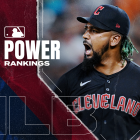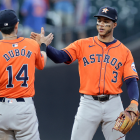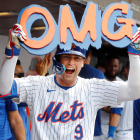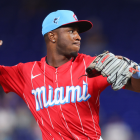Leading up to the announcement of the 2017 Baseball Hall of Fame class on Jan. 18, we're examining each of the 34 candidates on this year's BBWAA ballot. By way of reminder, a candidate must be named on at least 75 percent of submitted BBWAA ballots in order to be elected into the Hall of Fame.
We've already looked at the numerous candidates who are certain to fall off the ballot after only one year (candidates receiving less than five percent drop off the ballot). Now we're looking at those hopefuls who figure to have meaningful support and perhaps even earn induction at some point. Up this time around is flame-throwing lefty Billy Wagner.
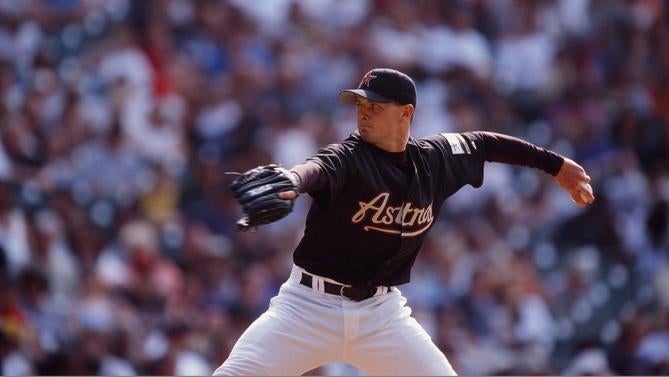
Wagner, who learned to throw left-handed after breaking his right arm as a child, played 16 big league seasons from 1995-2010 and was a reliever the entire time. He made zero career starts. Wagner spent most of his career with the Astros before moving on to the Phillies, Mets, Red Sox, and Braves. He retired with 422 saves, currently sixth most all-time, and a 2.31 ERA (187 ERA+) with 1,196 strikeouts in 903 innings.
In those 16 seasons Wagner was a seven-time All-Star who received twice received Cy Young votes (1999, 2006) and MVP votes (1999, 2003). He was fourth in the Cy Young voting in 1999 after saving 39 games with a 1.57 ERA (287 ERA+) and 124 strikeouts in 74 2/3 innings. Among pitchers to relieve in at least 95 percent of their career appearances, Wagner is sixth all-time in WAR:
- Mariano Rivera: 56.6 WAR in 1,283 2/3 innings
- Hoyt Wilhelm: 50.1 WAR in 2,254 1/3 innings
- Goose Gossage: 41.8 WAR in 1,809 1/3 innings
- Lee Smith: 29.4 WAR in 1,289 1/3 innings
- Trevor Hoffman: 28.0 WAR in 1089 1/3 innings
- Billy Wagner: 27.7 WAR in 903 innings
Wilhelm and Gossage are in the Hall of Fame, Rivera will be one day, and Hoffman seems likely to get in at some point as well. Smith is on the ballot for the 15th and final time this year and won't receive the 75 percent needed for induction.
Wagner's postseason career is short and ugly -- he allowed 13 runs on 21 hits and two walks in 11 2/3 innings in October. Most of that damage stems from the 2006 NLCS, when he allowed five hits in 2 2/3 innings against the Cardinals. Wagner never won a World Series or even had a chance to pitch in the Fall Classic. He went to the postseason seven times and only once did his team win the LDS.
The case for Wagner
Unlike Rivera, who is on his own level in the world of relievers, and Hoffman, who piled up a ton of saves, Wagner's case for the Hall of Fame requires some more deep thought. He was undeniably one of the best relievers of his generation. But was he one of the best all-time? That's complicated.
Let's compare Wagner to the five relievers currently in the Hall of Fame using rate stats. Reliever usage has changed over the years. The days of a closer throwing two or three innings at a time and finishing a season with 100-plus innings are long gone, so rate stats help even things out.
| Save % | ERA | WHIP | K/9 | K/BB | |
| Dennis Eckersley | 85 | 2.85 | 1.00 | 8.8 | 6.3 |
| Rollie Fingers | 76 | 2.90 | 1.16 | 6.9 | 2.8 |
| Goose Gossage | 73 | 3.01 | 1.23 | 7.5 | 2.1 |
| Bruce Sutter | 75 | 2.83 | 1.14 | 7.4 | 2.8 |
| Hoyt Wilhelm | 77 | 2.49 | 1.12 | 6.6 | 2.1 |
| Billy Wagner | 86 | 2.31 | 1.00 | 11.9 | 4.0 |
Those are career stats as a reliever only. Wagner never started a game, but Eckersley and the others sure did, so everything in that table only reflects each player's career when working out of the bullpen.
Compared to the five Hall of Fame relievers, Wagner has the highest save percentage, the lowest ERA, and the highest strikeout rate. On a per inning basis, he was as dominant as every one of those guys, if not more dominant. For example: Wagner had 335 more strikeouts than Sutter in 139 fewer innings!
Modern closers throw one inning a time. Maybe they get four outs on occasion, but not often. That's just the way the game has evolved. Wagner threw way fewer innings than the five Hall of Famers not necessarily because he couldn't throw more innings. That's just the way managers use relievers now.
Simply put, Wagner is one of the greatest one-inning forces in baseball history. Among pitchers with 500 career innings, he's tied with former Astros teammate Brad Lidge for the highest strikeout rate and is second in WHIP. Only Hall of Famer Addie Joss, who pitched from 1902-10, had a lower WHIP.
The case against Wagner
The biggest knocks against Wagner are his saves total and career workload. His 422 saves are impressive, no doubt, but he's far behind contemporaries Mariano Rivera (652) and Trevor Hoffman (601). Francisco Rodriguez passed Wagner in career saves this year and other active closers like Huston Street (324) and Craig Kimbrel (256) could do the same in coming years.
Also, Wagner did only throw 903 regular season in his career, which would be the second fewest among Hall of Famers. (Satchel Paige threw only 476 career innings after making his MLB debut at age 42.) Again, that's a function of his era. Closers throw one inning at a time. Wagner's career workload still lags considerably behind Rivera (1,283 2/3) and Hoffman (1089 1/3).
I suppose some could knock Wagner for his postseason performance, and let's be frank, 13 runs in 11 2/3 postseason innings is terrible, but it's 11 2/3 innings spread across a 16-year career. I can't knock him too much for such a small sample of innings. I see postseason performance as something that can help a player's Hall of Fame case but shouldn't take away from it too much.
Will he make it?
This is Wagner's second year on the Hall of Fame ballot. He received only 10.5 percent of the vote last year, far below the 75 percent needed for induction and only slightly better than the 5.0 percent needed to remain on the ballot another year.
"I believe becoming a Hall of Famer would be great," Wagner told CBSSports.com. "It's something as a kid you wouldn't believe would be possible. When you think of all the great players in the Hall, it's mind-blowing to know that you are on a ballot for the Hall of Fame."
As of this writing, Wagner has appeared on fewer than 15 percent of the publicly available Hall of Fame ballots according to Ryan Thibodaux's tracker. He's already been mathematically eliminated from receiving 75 percent of the vote, so no, Wagner won't get into the Hall of Fame this year. His goal now is to continue gaining support and inch closer to the 75 percent threshold to improve his case for future years.
"Actually, I don't have high hopes that I will join the incredible group in the Hall of Fame," added Wagner. "I'm pretty surprised I made it through the first year. I do pay attention to the voting more than I want to because it is a special thing, but I hate watch because when it comes to an end this year or next year, I will become just an average player. The goal was to be one of the best."
Assuming he continues to receive the 5.0 percent necessary to remain on the ballot, Wagner will be Hall of Fame eligible through the BBWAA vote for another eight years.
Other Hall of Fame cases: Posada | Ramirez | Guerrero | Rodriguez | Sosa | Wagner | Sheffield










